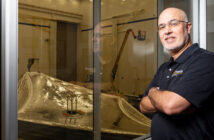The Boston Globe’s new editor has just been hired and the newsroom is abuzz.
Marty Baron, ‘76, enters a 10:30 a.m. editorial meeting, a first introduction to many of his new colleagues. He introduces himself, says he’s excited and tries to learn names.
It’s at the end of the meeting that Baron speaks up.
He wants to go after a story about Catholic priests, child abuse and how the Church covered it up.
There’s a mixed response — the Globe has seen this before. Some say the source isn’t reliable. The abuse claim was thrown out in the end. The Church will think it’s being sued. Essential documents are unavailable.
But, Baron presses, the story is there. The facts are there.
The meeting ends soon thereafter.
“Gutsy call for the first day,” an editor says.
The scene is from “Spotlight,” a 2015 independent film that captures the true story of the Globe’s investigative team, the story it uncovered and the editor that led it. Baron has pursued what he calls “honest and honorable” journalism throughout his career — from his beginnings at The Brown and White and his hometown paper, to his current position as executive editor of the Washington Post.
Touted by Esquire as one of the best editors of all time, Baron has been impacted by the places he’s worked and been an influencer in return. More attention has been called to his career as “Spotlight” has gained critical acclaim.
Baron will return to his roots and visit Lehigh on Feb. 18. to host a screening of “Spotlight” and a Q&A.
Baron at Lehigh
Baron spoke fondly about his days at Lehigh, particularly those spent working on The Brown and White, the student newspaper that he “surely spent more time on than (he) ever spent studying or in class.”

Washington Post executive editor Marty Baron, ’76, gives a presentation at Coppee Hall on March 17, 2014. Baron will be returning to Lehigh on Feb. 18 for a screening of Spotlight. (Courtesy of Lehigh Journalism Department)
He remembered looking at the walls of the newsroom — at that time, stationed in the basement of the UC — and reading clips from alumni who had come and succeeded professionally in journalism before him. Baron said the clips were something he perused frequently. They were snippets that not only showed what his predecessors might’ve been up to, but also served as sources of great inspiration.
“I think it had an enormous influence on me,” Baron said. “The Brown and White had a great history.”
Now, 40 years after his departure from South Mountain, Baron’s own experience has become part of the paper’s legacy, too.
Bill White, ‘74, an adjunct professor in Lehigh’s journalism department, worked alongside Baron in what he calls the paper’s “golden age.” The young reporter’s talent, he says, was identifiable even then.
“There were all kinds of people working on The Brown and White…some who are really dedicated to what they’re doing, and some who are just having fun or aren’t willing to devote that much attention to it,” White said. “He was one of the ones that was really good right from the beginning.”
Baron, too, believed in the capabilities of his newspaper team. Much of what The Brown and White reporters covered under his tutelage dealt with issues of personal privacy and controversy, as well as sensitive content with potential to offend an individual, or even the administration.
“I think we were pretty aggressive as journalists, particularly for the university at that time,” Baron says.
But even at the forefront of a strong operation, Baron was no stranger to the stigma of attending a university often considered solely an engineering or business school.
“It was always annoying, frankly, because any time I was ever telling someone that I was going to Lehigh, they would ask if I was going to study engineering,” he said.
Yet, Baron said he found value in being surrounded by those who knew little of journalism, those who didn’t care much for it, or regarded it with suspicion and skepticism.
“I also happened to feel that I wasn’t living in an ivory tower, and that at Lehigh I was very much connected to the real world, which I thought was a plus,” he said. “It really helped me understand how ordinary people react to stories, react to controversies. It’s very important to be sort of grounded in the real world, to have an innate understanding of how people in other fields will react to certain types of stories.”
Baron, too, took advantage of another field. He added a master’s degree in business administration to his bachelor’s degree in journalism through a then-existing Arts and MBA program.
The entire process was slotted to take five years. With a combination of AP credits and petitions to take graduate-level courses early, Baron did it in four.
But pursuing business wasn’t necessarily the plan. After all, Baron had wanted to be a journalist since junior high school.
“(I did it for) two reasons,” he said. “Because I knew journalism was becoming specialized, and so I had something to fall back on.”
Lucky for Baron — as he said himself — his career started a year later. In the 1970s, the business journalism industry was “exploding” and Baron, armed with dual degrees and a business-savvy brain, capitalized on it.
A prestigious career
Baron’s career — which has taken him across the country to work at the likes of the New York Times and Los Angeles Times, among others — began with reporting in Stuart, Florida, for the Miami Herald. Covering the small city was the beginning of a career that would eventually lead Baron to some of the top positions in American journalism.
The Herald later offered Baron a business reporting position. The industry was becoming more specialized during the 1970s, and business journalism was in particular demand. This trend would work in Baron’s favor.
“I think it’s important for journalists not to be intimidated by the people they have to cover and to be well-rounded on the subject matter,” Baron said. “So when I interviewed business people it felt as if I knew the subject matter just as well as they did.”
Baron’s business background provided him with a greater understanding of financial matters — a contributing factor in his success as a business reporter. These skills proved invaluable throughout his career, particularly in becoming a business editor for the LA Times, per the publication’s request, and later, returning to the Miami Herald as executive editor. In these top positions, Baron would have to think about more than just editorial elements.
“It helped me very much later in my career when I became an editor — particularly a top editor — and got much more involved in issues of strategy in a changing economic environment for news organizations,” Baron said. “I was able to bring my business background to bear on those kinds of subjects.”
During his time in Los Angeles, Baron was afforded his first experience with writing stories that were both national and international in scope. It was here that he first worked as a professional editor of the newspaper’s Orange County edition, overseeing a staff of 165 people. It was the biggest operation Baron had run.
But it wouldn’t be the last. Soon after, he took an associate managing editor position at the New York Times. Baron’s career was upward trending.
In 2000, during his 18-month return to the Herald, Baron guided the paper to a Pulitzer Prize for breaking news reporting. The award was for the paper’s breaking coverage of a raid by federal agents to recover a young Cuban boy named Elián González, who had been at the center of an immigration and custody battle.
Herein, as in various subsequent points in his career, Baron was tasked with challenging powerful institutions and holding them accountable. His commitment to vigilance and justice has been a central theme throughout Baron’s career.
Two years ago, during his speech at Lehigh’s 146th spring commencement, Baron spoke in defense of his strongly-held journalistic principles.
“No one should be immune from responsibility —least of all, the powerful,” Baron said during the speech. “And no one should be denied a hearing — least of all, the powerless. We owe them a duty to listen and to help.”
During his 11 years of leadership at the The Boston Globe, the newspaper won six Pulitzer Prizes for public service, explanatory journalism, national reporting and criticism.
In 2013, Baron joined the staff of the Washington Post as executive editor. There, too, he has overseen a transformation of the paper, as well as two Pulitzer Prize-winning endeavors in 2014.
The Post’s revelations about the National Security Agency’s surveillance of the American public carried immense reputational and legal risks, as well as the potential for major consequences. But Baron chose to have them published, as he felt they served the public interest.
“To me, holding power to account is what the press exists to do,” Baron said during his commencement speech, “and what often only the press can and will do.”
His devotion to journalism is no secret to those who know him.
Jack Lule, the head of Lehigh’s journalism department, said that he has known Baron for over 25 years and considers him to be a loyal alum.
“But the biggest thing with (Baron),” Lule says, “is that he lives and breathes journalism, and you don’t see him too much outside of the journalism circle.”
Lule says this, if anything, is Baron’s greatest weakness: being too committed to his work.
“He knows the right thing to do — the right thing for himself, he knows the right thing for his newspaper to do, he knows the right thing for journalism to do, and is committed enough to make those things happen.”
And it was exactly those qualities that have led to Baron’s success throughout his career, specifically with respect to reporting about the Catholic Church sex abuse scandal uncovered by the Spotlight team at The Boston Globe.
From newsroom to silver screen
In 1970, The Boston Globe created the Spotlight team — a division of reporters dedicated to pursuing investigative pieces.
In 2015, the Open Roads Films company made a movie about the group and one of its triumphs as a reporting team. Among the cast list was Liev Schreiber, the actor who was to portray Marty Baron.
As editor of the Globe from 2001 to 2012, Baron encouraged the Spotlight team to uncover the abuses of priests that had been covered up, for years, by the Catholic Archdiocese of Boston. After five months of interviews and research, the first article was published in January 2002 and shocked the Boston community — much of which is Catholic.
Baron, who is neither Catholic nor from Boston, guided the team and ensured the objective telling of the story and detailing of the abuses. Lule said Baron’s ability to guide teams while also allowing them to work to their strengths is what makes him such a strong leader.
The Globe won a Pulitzer Prize in 2003 for their coverage of the abuses, and the Spotlight piece led to follow-up articles on sexual abuses by priests, as well as the Church’s attempts to cover them up, both in Boston and around the world.
The movie chronicles Spotlight’s investigative reporting from the initial interviews with victims to the publication of the first piece about the scandal.
Baron and the other Spotlight reporters were involved with the making of the film from the first stages to the final cuts. The reporters were first approached in 2008 by director Tom McCarthy and co-writer Josh Singer about the possibility of a movie.
“Hours upon hours” of interviews about their investigative experiences were followed by readings of the script and an early screening of the movie, according to Baron. Schreiber and Baron spent time together to ensure the actor’s accurate portrayal, nuances — such as speech patterns or mannerisms — included.
“Spotlight” the movie portrays the shoe-leather journalism that was required to tell the story of the abuses committed by the priests. Baron said it shows the dedication of journalists who were driven to expose the truth and hold large institutions accountable while conveying the idea that a free press is necessary for our society.
While the film has been commercially successful — winning a Screen Actors Guild Award and receiving nominations for several other awards, including an Academy Award — Baron does not believe this takes away from the quality of the initial investigation and following pieces of the Spotlight team.
“This is the story that I found most fulfilling,” Baron said. “It’s the story that had the greatest impact. It’s the story that affected the lives of ordinary people more than any other that I was involved in, and it’s a story that quite definitely changed the world.”






Comment policy
Comments posted to The Brown and White website are reviewed by a moderator before being approved. Incendiary speech or harassing language, including comments targeted at individuals, may be deemed unacceptable and not published. Spam and other soliciting will also be declined.
The Brown and White also reserves the right to not publish entirely anonymous comments.
4 Comments
Don’t be duped by ‘Spotlight’.
It is an incredibly dishonest film.
‘Spotlight’ EXPOSED (as cited in the NYT):
themediareport(DOT)com/2015/11/30/spotlight-movie-review/
–
Please peddle your conspiracy theories elsewhere–the “report” you mention is something you wrote on your own website. You wouldn’t know the truth if it landed on top of you.
One of the best profiles I have read anywhere of Marty Baron.
So well done!